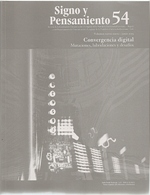Abstract
This article is the result of research work (still in progress) on state of the art Mass Multiplayers Online Games (mmolg), in an attempt to build a theoretical and methodological descriptive framework of mmolgs that synthesizes the main approaches and problems susceptible of study on the knowledge so far produced vis-à-vis this cultural phenomenon. The research team is constituted by lecturers in charge of four research groups of the School of Language and Communications, i.e. Language and Cognition; Information Sciences, Society, and Culture; Communications and Media, Culture, and Learning; and Information Society.
Chiuppesi, M. (2005), “MMORPG: a review of social studies” (en línea), disponible en: http:// www.serra.unipi.it/dsslab/trimestrale/2005/ mmorpg%20-%20en.pdf, recuperado: 1 de mayo de 2008.
Gil, R.; Tavares, J. P., y Roque, L. (2005), “Architecting Scalability for Massively Multiplayer Online Gaming Experiences”, University of Coimbra.
Huizinga, J. (1998), Homo Ludens, Madrid, Alianza.
Kelman, N. (2008), “La era del videogame” (en línea), disponible en http://archivodocumental.wordpress.com/category/informatica/videojuegos/ recuperado: 21 de abril de 2008.
Klastrup, L. (2003), A Poetics of Virtual Words. Proceedings of the Fifth International Digital Arts and Culture Conference, RMIT, Melbourne. “Multiplayer on Line Game Directory” (en línea), disponible en: http://www.mpogd.com/ games/massively.asp?first=Z, recuperado: 27 de noviembre de 2007.
Murray, J. (1997), Hamlet in the Holodeck, the Future of Narrative in Cyberspace, MIT Press, Cambridge.
Salazar, J. (2005), “On the Ontology of mmorpg Beings: A Theoretical Model for Research. Proceedings of DIGRA 2005”, en Changing Views-Worlds in Play (en línea), disponible en http://www.digra.org, recuperado: 2 de abril de 2008.
Salazar, J. (2004), “Cybontology: The Ontology of the Online Being and the (re)localization of the Notion of the ‘cyborg’”, en II Congreso online del observatorio para la cibersociedad (en línea), disponible en http://www.cibersociedad.net/congres2004/index_es.html, recuperado: 8 de mayo de 2008.
Squire, K. (2002), “Cultural Framing of Computer/Video Games”, Game Studies, vol. 2, Issue 1.
Squire, K., Steinkuehler, C. (2004), Generating Cybercultures; The Case of Star Wars Galaxies. Chapter Submission for Cyberlines: Languages and cultures of the Internet, 2. a ed., Albert Park (Australia), James Nicholas Publisher.
Taylor, T. L. (2004), “The social Design of Virtual Worlds: Constructing the User and Community Through Code”, en: Consalvo M. et al. (eds.), Internet Research Annual, vol. 1, Selected Papers from de Association of Internet Researchers Conferences 2000-2002, Nueva York, Peter Lang.
This journal is registered under a Creative Commons Attribution 4.0 International Public License. Thus, this work may be reproduced, distributed, and publicly shared in digital format, as long as the names of the authors and Pontificia Universidad Javeriana are acknowledged. Others are allowed to quote, adapt, transform, auto-archive, republish, and create based on this material, for any purpose (even commercial ones), provided the authorship is duly acknowledged, a link to the original work is provided, and it is specified if changes have been made. Pontificia Universidad Javeriana does not hold the rights of published works and the authors are solely responsible for the contents of their works; they keep the moral, intellectual, privacy, and publicity rights.
Approving the intervention of the work (review, copy-editing, translation, layout) and the following outreach, are granted through an use license and not through an assignment of rights. This means the journal and Pontificia Universidad Javeriana cannot be held responsible for any ethical malpractice by the authors. As a consequence of the protection granted by the use license, the journal is not required to publish recantations or modify information already published, unless the errata stems from the editorial management process. Publishing contents in this journal does not generate royalties for contributors.


